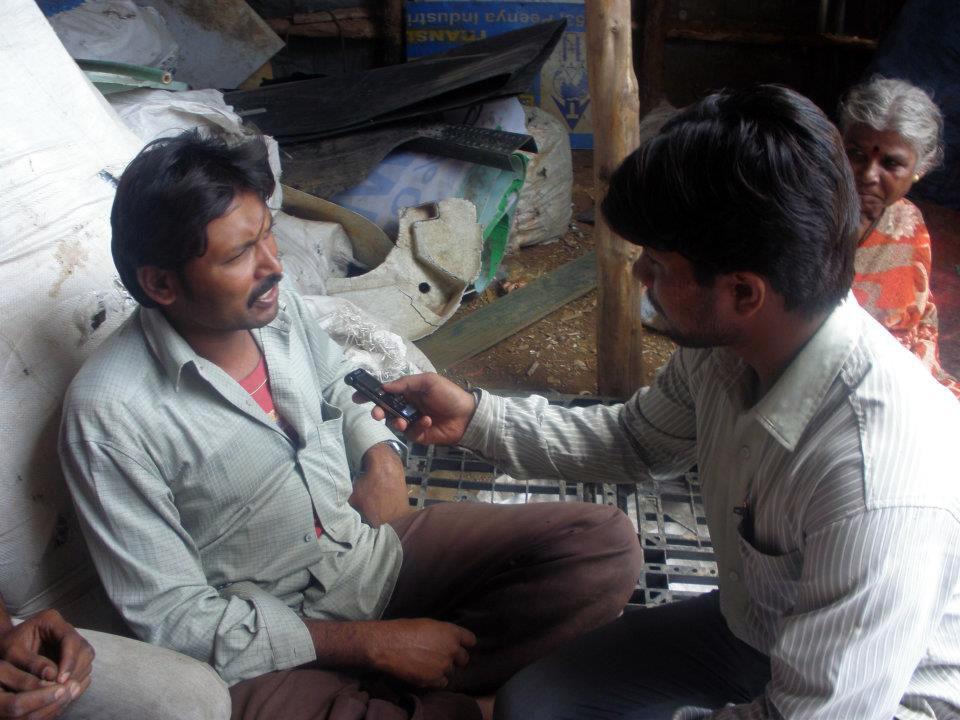A waste-picker community in Bangalore, India, has taken a step out of social alienation and voicelessness to produce a radio show. The aim is to empower and educate the waste-picking communities in slums across the country, and to assert the waste-picker’s right to dignity in labor.
The radio show is titled Kasa Shramika Parisara Rakshaka, which means “waste pickers are saviors of the environment.” It is aired on community radio, Radio Active 90.4 MHz, Monday to Friday from 11 a.m. To 11:30 a.m. IST. It first broadcast in January 2012 in one language, one day a week, but it has spread across the city and now broadcasts in five languages, reaching a broad swath of Bangalore’s waste-pickers.
“Waste-pickers and scrap-dealers are silent environmentalists, but they are not recognized,” said Pinky Chandran of Radio Active, who is also a member of the Solid Waste Management Roundtable (SWMRT).
She described the origins of the idea: “It all started at a meeting at the SWMRT in 2010 in Bangalore. An activist, Nalini Shekhar, who had worked with waste-pickers in Pune city brought attention to the need for the Roundtable to engage in policy advocacy with the local urban administration.”
Several organizations came together to assist the local administration in conducting the waste-picker registration and scrap-dealer enumeration. They also mobilized the waste-pickers and helped them form a city-level cooperative called Hasiru Dala (Green Force) in June 2011.
The show produces and broadcasts programs in five Indian languages—Kannada, Tamil, Telugu, Urdu and Bengal—as it caters to listeners in various slums speaking multiple languages. Hosted by waste-pickers, it offers waste-pickers a platform to air their views, share life stories, highlight issues, and seek solutions.
“The programs are totally up to them to decide—from problems, to life stories, to rights & entitlements, to atrocities faced, increased sales, livelihood, children’s education, to cultural issues including cooking. … It varies from area to area,” Chandran explained.
Hunumanth Raju, a young waste picker who is in the seventh month of his broadcaster’s training at the station, comes from the Jakasandra slum where about 300 migrant families live. Earning 300–350 rupees (US$6–7) a day by picking and selling waste, Raju never thought his voice would be able to reach his community this way.
“Waste-picking is my only livelihood. Through the show I’m able to talk about my profession and share the various problems faced by my community. This is a big thing for me.”
The show first broadcast on Jan. 26, 2012, on India’s Republic Day. “The show’s first RJs [radio jockeys] were a waste-picker wife and husband, Salma and Siddique,” Chandra explained. “At that time, the show was broadcast only in the Urdu language once a week.”
Now, the anchors of the show vary from slum to slum as their language and dialect varies. Raju is one of the regular RJs at the Bommanahalli zone.
For a long time, waste-pickers have been looked down upon in the Indian society. There are more than a million waste pickers in India, most of them from socially marginalized groups. Their profession is not recognized by the government.
“I feel happy that I can talk to my community on air in my language—Bengali,” Raju said. “At least there’s someone I can talk to.”
On 17th of every month, around 30–100 waste pickers gather in the Hasiru Dala office which is housed at Radio Active and discuss their various issues. “This meeting is important as slum leaders come in most of the time and they discuss issues of relevance of the month, and program ideas usually stem from these meetings,” Chandran said.
The radio program is especially a boost for female pickers, who now have an opportunity to learn new skills.
Sujata Shekhar, 28, works as a sorter, categorizing and grading waste. Now, she is also a radio RJ. A mother of two small children, Shekhar first goes to the slums with her voice recorder, records the programs, and then goes to the studio.
“However, I don’t know editing well,” Shekhar said. She only attended school until the seventh grade. “Since I haven’t had much education, I find editing difficult. However, I’m learning.”





